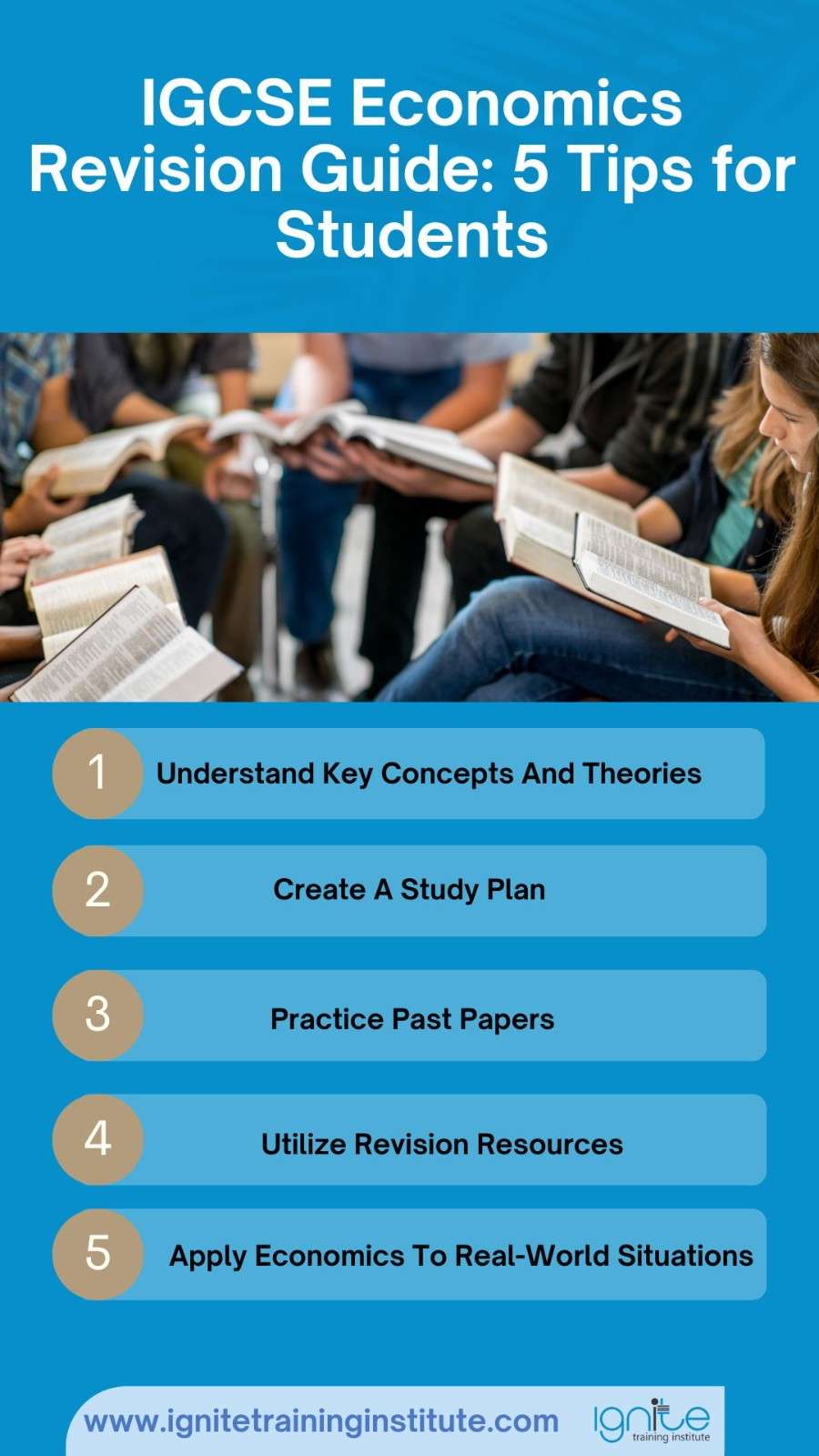IGCSE Economics provides students with a robust foundation in understanding economic systems and principles, bridging the gap between theoretical concepts and real-world applications. Covering essential topics such as market dynamics, economic policies, and global economic trends, this course equips students with critical analytical skills.
Ignite Training Institute, offers a specialized IGCSE Economics Tutoring Course designed to help students excel in their exams and gain a thorough grasp of the subject. Our expert tutors are committed to delivering personalized instruction that enhances comprehension and fosters academic success in Economics.
Cambridge IGCSE Economics Overview
The Cambridge IGCSE Economics course is designed to provide students with a solid foundation in economic theory, as well as practical applications of these concepts in real-world scenarios. The curriculum covers a range of topics including basic economic principles, the functioning of different economic systems, and the role of governments and international organizations in the economy.
Students are introduced to fundamental concepts such as demand and supply, market structures, production and costs, and macroeconomic indicators like GDP, inflation, and unemployment. The course also emphasizes the importance of understanding how economic decisions affect individuals, businesses, and societies at large.
Assessment for Cambridge IGCSE Economics is typically divided into two components: Paper 1 (multiple-choice questions) and Paper 2 (structured questions), allowing students to demonstrate both their knowledge and analytical skills. This curriculum is well-regarded for its emphasis on developing critical thinking and the ability to apply economic theory to contemporary issues.
Related: IGCSE Biology: AQA, Edexcel, & CIE Exam Boards Insights
Edexcel IGCSE Economics Overview
The Edexcel IGCSE Economics course offers students a comprehensive introduction to economic principles and their practical applications. The curriculum is designed to help students develop a deep understanding of how economies operate at both the micro and macro levels. It covers topics such as the allocation of resources, the role of markets, government intervention, international trade, and economic development.
The course is divided into four main sections:
- The Market System: This section introduces students to the basic economic problems of scarcity, demand and supply, market equilibrium, and how markets function.
- Business Economics: Focuses on the production process, the different types of businesses, and how they make economic decisions.
- Government & The Economy: Explores the role of government in the economy, including taxation, public spending, and policies to correct market failures.
- The Global Economy: Discusses international trade, exchange rates, and the impact of globalization on economies.
Assessment is typically done through two examination papers: Paper 1, which is focused on microeconomics, and Paper 2, which covers macroeconomics and global economics. These assessments are designed to test students’ knowledge, understanding, and ability to analyze and evaluate economic issues.
Related: IGCSE Chemistry: AQA, Edexcel, & CIE Exam Boards Insights
IGCSE Economics Past Paper Resources
Preparing for the IGCSE Economics exam can be significantly enhanced by practicing with past papers. These past papers offer invaluable insight into the types of questions that may appear on the exam and help students familiarize themselves with the exam format, question styles, and time management strategies.
Cambridge International provides a comprehensive collection of past papers for IGCSE Economics. By accessing these past papers, students can practice answering real exam questions and review the corresponding mark schemes to understand what examiners are looking for in high-scoring responses.
You can explore and download these past papers directly from the Cambridge IGCSE Economics past papers page. This resource is an excellent tool for effective exam preparation.
Related: IGCSE Physics: AQA, CIE, & Edexcel Exam Boards Overview
IGCSE Economics Syllabus 2025: Know The Specifications
The IGCSE Economics syllabus for 2025 introduces students to a comprehensive understanding of economic principles and real-world applications. The syllabus is structured to help students develop analytical skills, understand economic concepts, and apply them to various economic scenarios.
Key Specifications:
- Core Topics:
- Basic Economic Problem: Understanding scarcity and resource allocation.
- Market Dynamics: Demand and supply, price determination, and market structures.
- Government Intervention: Policies to address market failures, taxation, and subsidies.
- International Trade: Trade barriers, exchange rates, and globalization impacts.
- Development Economics: Economic growth, development indicators, and sustainability.
- Assessment Structure:
- Paper 1: Multiple-choice questions covering a broad range of topics.
- Paper 2: Structured questions that test deeper understanding and analytical skills.
- Paper 3 (for extended students): Focuses on data response and problem-solving in economic contexts.
- Learning Outcomes:
- Ability to analyze economic data and trends.
- Critical evaluation of economic policies and their impacts.
- Understanding the global economic environment and its influence on local economies.
The 2025 syllabus also emphasizes the importance of understanding contemporary economic issues and preparing students for further education in economics or related fields.
Related: How To Study For IGCSE Biology? 10 Must-Know Tips
IGCSE Economics Grading System
The IGCSE Economics grading system follows the general structure of the IGCSE grading framework, where students are evaluated on a scale from A* to G. The highest grade achievable is A*, and the lowest passing grade is G. Each grade reflects the student’s performance, with A* representing exceptional understanding and proficiency in Economics, while lower grades indicate varying levels of mastery.
For students who do not meet the minimum criteria for a G grade, a U (ungraded) is awarded, indicating that the work does not meet the required standard.
The grading system for IGCSE Economics, like other subjects, is criterion-referenced, meaning students are graded against set criteria rather than against the performance of their peers. This ensures that grades reflect a student’s actual knowledge and skills in Economics, based on their ability to meet specific learning objectives.
Related: IGCSE Computer Science: Syllabus Overview & Paper Details
IGCSE Economics Revision Guide: 5 Tips for Students

Preparing for the IGCSE Economics exams can be a challenging yet rewarding experience. To help you navigate this journey with confidence, we’ve compiled five essential revision tips to ensure you’re well-prepared and ready to excel.
1. Understand Key Concepts And Theories
Economics is built on foundational concepts and theories that are crucial for understanding the subject. Start by familiarizing yourself with the core principles such as supply and demand, elasticity, market structures, and macroeconomic indicators. Use textbooks, class notes, and online resources to deepen your understanding.
Focus on how these concepts interconnect and apply to real-world scenarios. This will help you tackle a range of questions and improve your problem-solving skills during exams.
2. Create A Study Plan
Effective revision requires a structured approach. Develop a study plan that allocates specific times for each topic based on its complexity and your level of confidence. Divide your study sessions into smaller, manageable segments, and include regular breaks to stay focused and prevent burnout. Prioritize areas where you feel less confident and review them more frequently. A well-organized study plan will help you cover all necessary material and keep track of your progress.
3. Practice Past Papers
One of the most effective ways to prepare for your IGCSE Economics exam is by practicing past papers. These provide valuable insight into the format of questions and the types of topics frequently tested. Start by answering questions under timed conditions to simulate the exam environment.
Review your answers critically and compare them with the mark schemes to understand where you can improve. Regular practice will help you become familiar with the exam style and boost your confidence.
4. Utilize Revision Resources
Make the most of available revision resources such as study guides, online tutorials, and revision apps. Websites like BBC Bitesize, Khan Academy, and Quizlet offer useful content tailored to IGCSE Economics.
Additionally, consider joining study groups or forums where you can discuss concepts with peers and seek clarification on challenging topics. Using a variety of resources will provide different perspectives and enhance your understanding.
5. Apply Economics To Real-World Situations
To deepen your grasp of economics, relate theoretical concepts to real-world events and scenarios. Follow current economic news and analyze how it reflects the principles you’ve studied. For example, observe how changes in government policy impact the economy or how market trends affect supply and demand.
This practical application of knowledge not only reinforces learning but also helps you develop critical thinking skills that are valuable for answering exam questions.
Related: Edexcel IGCSE Biology Syllabus – A Student’s Critical Guide
Enroll In IGCSE Economics Tutoring Course With Ignite Training Institute
Unlock your inner potential in IGCSE Economics with Ignite Training Institute’s expert tutoring support. Our tailored coaching programs are designed to help students master key economic concepts and excel in their exams.
With a focus on personalized training, our experienced tutors provide in-depth knowledge and practical insights into the Edexcel IGCSE Economics syllabus.
Whether you’re aiming to understand complex economic theories or improve your exam strategy, our courses offer comprehensive support and resources. Enroll today and benefit from a structured learning environment that fosters academic growth and confidence.
At Ignite Training Institute, we are committed to helping you achieve your best in IGCSE Economics and beyond.
Related: Best IGCSE Tutors In Dubai To Achieve Grade Excellence
FAQs
1. How Hard Is IGCSE Economics?
IGCSE Economics can be challenging, depending on your understanding of economic concepts and analytical skills, but it’s manageable with consistent study and practice.
2. What Is IGCSE Economics About?
IGCSE Economics explores the principles of micro and macroeconomics, including supply and demand, market structures, and economic policies.
3. Is Igcse Very Hard?
The difficulty of IGCSE depends on the subject and the student’s preparation; it can be challenging but is generally considered manageable with adequate study.
4. How Many Papers Are There In IGCSE Economics?
IGCSE Economics typically includes two papers: Paper 1 (short-answer and data-response questions) and Paper 2 (extended response questions).
Conclusion
IGCSE Economics offers a comprehensive introduction to economic principles and practices, providing valuable insights into how economies function. By exploring both micro and macroeconomic concepts, students develop critical thinking skills and a deeper understanding of global economic issues.
With its structured assessment and focus on real-world applications, IGCSE Economics not only prepares students for further study but also equips them with essential knowledge applicable to everyday life and future careers. Embrace the challenge, and you’ll find that the skills and insights gained from this course are well worth the effort.
Related: 10 Easiest IGCSE Subjects In 2024 For Academic Excellence


